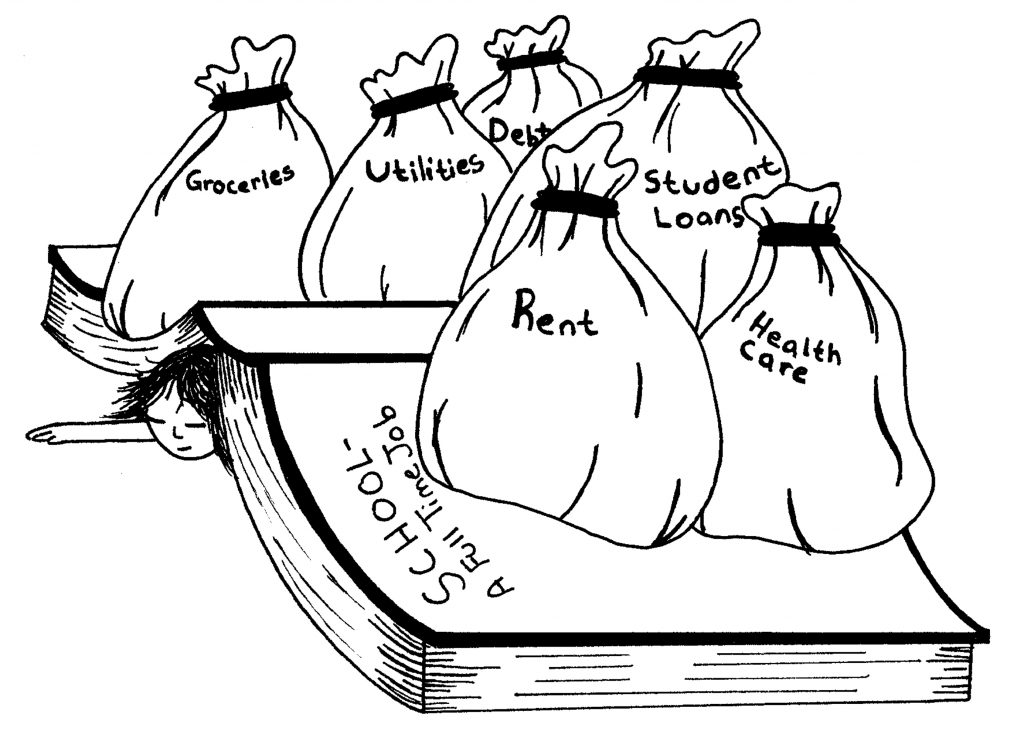
Chrys Weedon | Entertainment Editor
A month ago, I was sitting in my apartment, reading over my Western graduate school application. The information included in the packet was what one would expect: class breakdowns, requirements for recommendation letters and the like. But as I was skimming, I came across something that shocked me: “graduate study is a commitment equivalent to a full-time job.” The application went on to say that at most, students should work 15 to 20 hours a week on top of their schoolwork and possible internships.
After asking around, I learned that many of my friends attending Western have experienced their programs of study strongly recommending that they do not have a job, but instead, focus all of their energy on school, internships and practicums.
I believe that this standard is unrealistic and unsustainable for a majority of students, unless someone has the privilege of having their college paid for without having to take out loans or work. It is ignorant to expect students to put school before everything else in their lives.
The average cost of rent in Monmouth per apartment is about $896, which is a 1.79 percent increase from 2018 and a 2.34 percent increase from just last month, according to rentjungle.com. A one bedroom apartment is on average about $788 per month, and a two bedroom is around $950. According to the same website, rent continues to rise. Minimum wage in Monmouth is $10.75 an hour. This means that someone living in Monmouth has to work over 20 hours a week just to make rent, assuming that they pay the full bill themselves — and that is not including the cost of utilities, groceries and other basic living expenses. Also not included is money to spend on luxuries.
So, a student has to work 20 hours minimum just to get close to making rent, and their program suggests they only work 20 hours per week at the most.
Many programs advertise themselves as a “full time job,” meaning students will invest 40 hours per week into their education. 20 hours minimum of work added onto the 40 hours of schoolwork adds to 60 hours per week of work. That is not even calculating the cost of food, or other unexpected costs like car maintenance or health care costs. Isn’t that asking too much?
All of this isn’t considering time off, either. A student overworked is a student that isn’t thriving. If a student is working 60-plus hours a week, then who knows when they have time put aside for themselves. Time for socializing with friends and investing in self-care are arguably two of the most important things for anyone, especially students. However, they are usually the things that are sacrificed first, for the sake of keeping up in school and at home.
I know that at an individual level, most professors and school administrators expect students to sacrifice their security in order to focus on school. But at an institutional level, I worry that there is an unhealthy expectation that students should not work, but instead pour all of their energy into school. In a perfect world, every student would be able to give 100 percent to school. But this is not an ideal world.
Personally, I often feel preoccupied with my financial situation. I am the kind of person who doesn’t want to be obsessed with money, but I’m regularly forced to be. Juggling classes, a job, and paying bills, I honestly don’t often have the time or the energy to do things that I enjoy. Time with my friends is usually the first thing I sacrifice, and when I do spend time with them I feel guilty that all I do is complain about how busy I am. In my studies, I often hear about burnout, and many times it is taught as an issue only professionals have to deal with. But I would argue that the majority of students, including myself, are actively experiencing burnout right now.
Many colleges and universities hold the same kind of “school should be your job” mentality. This mentality ignores the reality that most college students face: a reality where it is virtually impossible to survive without a job while they’re in school. These institutions do not have their student’s best interest at heart. It’s almost like they have an ulterior motive.
Contact the author at cweedon16@wou.edu
Illustration by Rachel Hetzel

